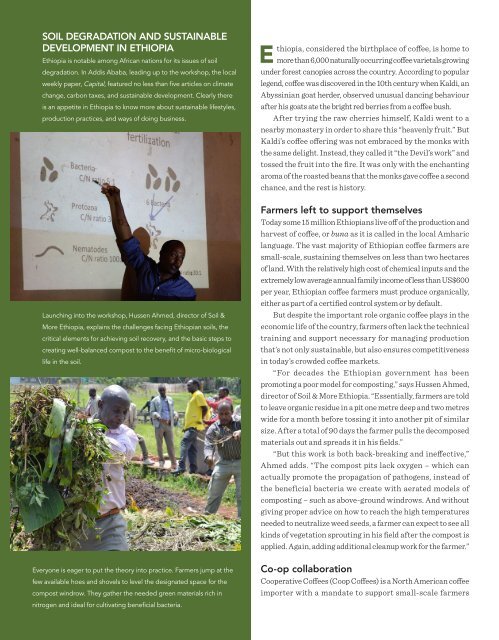FTM-July2017-Issuu
Create successful ePaper yourself
Turn your PDF publications into a flip-book with our unique Google optimized e-Paper software.
SOIL DEGRADATION AND SUSTAINABLE<br />
DEVELOPMENT IN ETHIOPIA<br />
Ethiopia is notable among African nations for its issues of soil<br />
degradation. In Addis Ababa, leading up to the workshop, the local<br />
weekly paper, Capital, featured no less than five articles on climate<br />
change, carbon taxes, and sustainable development. Clearly there<br />
is an appetite in Ethiopia to know more about sustainable lifestyles,<br />
production practices, and ways of doing business.<br />
Launching into the workshop, Hussen Ahmed, director of Soil &<br />
More Ethiopia, explains the challenges facing Ethiopian soils, the<br />
critical elements for achieving soil recovery, and the basic steps to<br />
creating well-balanced compost to the benefit of micro-biological<br />
life in the soil.<br />
Everyone is eager to put the theory into practice. Farmers jump at the<br />
few available hoes and shovels to level the designated space for the<br />
compost windrow. They gather the needed green materials rich in<br />
nitrogen and ideal for cultivating beneficial bacteria.<br />
Ethiopia, considered the birthplace of coffee, is home to<br />
more than 6,000 naturally occurring coffee varietals growing<br />
under forest canopies across the country. According to popular<br />
legend, coffee was discovered in the 10th century when Kaldi, an<br />
Abyssinian goat herder, observed unusual dancing behaviour<br />
after his goats ate the bright red berries from a coffee bush.<br />
After trying the raw cherries himself, Kaldi went to a<br />
nearby monastery in order to share this “heavenly fruit.” But<br />
Kaldi’s coffee offering was not embraced by the monks with<br />
the same delight. Instead, they called it “the Devil’s work” and<br />
tossed the fruit into the fire. It was only with the enchanting<br />
aroma of the roasted beans that the monks gave coffee a second<br />
chance, and the rest is history.<br />
Farmers left to support themselves<br />
Today some 15 million Ethiopians live off of the production and<br />
harvest of coffee, or buna as it is called in the local Amharic<br />
language. The vast majority of Ethiopian coffee farmers are<br />
small-scale, sustaining themselves on less than two hectares<br />
of land. With the relatively high cost of chemical inputs and the<br />
extremely low average annual family income of less than US$600<br />
per year, Ethiopian coffee farmers must produce organically,<br />
either as part of a certified control system or by default.<br />
But despite the important role organic coffee plays in the<br />
economic life of the country, farmers often lack the technical<br />
training and support necessary for managing production<br />
that’s not only sustainable, but also ensures competitiveness<br />
in today’s crowded coffee markets.<br />
“For decades the Ethiopian government has been<br />
promoting a poor model for composting,” says Hussen Ahmed,<br />
director of Soil & More Ethiopia. “Essentially, farmers are told<br />
to leave organic residue in a pit one metre deep and two metres<br />
wide for a month before tossing it into another pit of similar<br />
size. After a total of 90 days the farmer pulls the decomposed<br />
materials out and spreads it in his fields.”<br />
“But this work is both back-breaking and ineffective,”<br />
Ahmed adds. “The compost pits lack oxygen – which can<br />
actually promote the propagation of pathogens, instead of<br />
the beneficial bacteria we create with aerated models of<br />
composting – such as above-ground windrows. And without<br />
giving proper advice on how to reach the high temperatures<br />
needed to neutralize weed seeds, a farmer can expect to see all<br />
kinds of vegetation sprouting in his field after the compost is<br />
applied. Again, adding additional cleanup work for the farmer.”<br />
Co-op collaboration<br />
Cooperative Coffees (Coop Coffees) is a North American coffee<br />
importer with a mandate to support small-scale farmers


